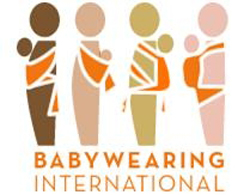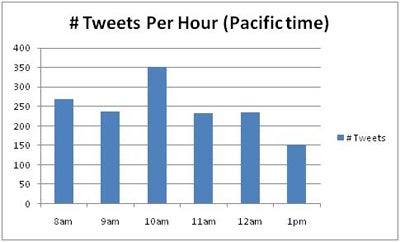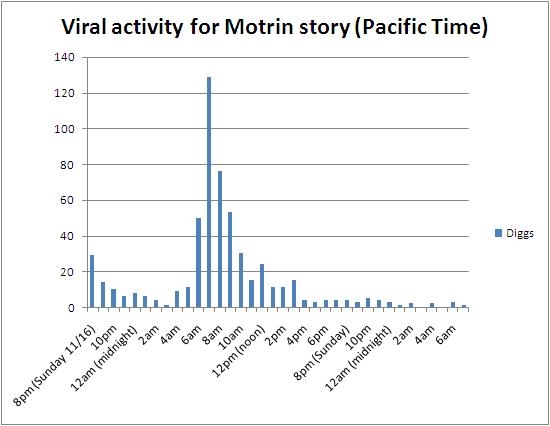On November 12, the non-profit Babywearing International launched International Babywearing Week, a week when “nonprofit babywearing groups all over the world are celebrating babywearing, and thousands of volunteers are working to publicize the benefits of babywearing and to encourage the practice of babywearing.”
Johnson & Johnson isn’t a sponsor as far as we can tell, but the J&J brand Motrin (or, more likely, their ad agency McNeil Consumer Healthcare) certainly did its part to popularize babywearing—the idea of carrying a baby around in a sling-type carrier—over the weekend, inadvertently bringing down a firestorm of criticism on itself.
How It Started
Over the weekend, the online ad on Motrin.com featured a voiceover from a babywearing mom. Here’s what Motrin.com looked like on Saturday evening, Pacific time. (The ad has also been reposted to YouTube here.)
Some mothers took offense, claiming the ad made babywearing look like a mother’s attempt to carry her baby around as a trendy accessory. They started talking on Twitter, shot up the views of the original ad on YouTube from 0 to 46,000 in 24 hours, and, on a slow news Monday, did enough to convince reporters to flog the story, even as news broke of a high-profile insider trading announcement and a meeting of McCain and Obama in Chicago.
YouTube played a role, but Twitter, a favorite of both self-important bloggers and reporters trolling for story ideas, became the arena of conversation for this overblown misunderstanding.
By the Numbers
The ad itself did not attempt to insult mothers, unlike last year’s Toyota Prius advertisement, for example, which outright insulted Fresno, California, calling it a “ghost town” for comedic value. In Motrin’s case, not only did some mothers take offense, but the fact that other people did not find the ad offensive caused them to discuss it more, which only gave the story legs. The graph below shows the activity on Twitter for the six hours that the East and West Coasts of the United States overlap during business hours. 250-350 Tweets per hour is an impressive rate of conversation.
Digg.com, where everything viral ends up eventually, shows a similar graph of activity starting Sunday November 15th and tapering off a day later.
To its credit, McNeil Consumer Healthcare recognized that it had a problem on its hands—and it also realized that it wasn’t particularly important to the Motrin brand that this particular piece of advertising creative be defended. A message on the Motrin.com Web site, which was unavailable for a period of time today, announces that the creative is being removed from all media and makes a sincere apology to moms offended by it.
.jpg)
What did McNeil Consumer Healthcare do wrong or right, and what should you learn from it?
McNeil’s quick response saved them from a bigger headache.
Recognizing that the issue at hand was the creative, McNeil did the smartest thing possible and killed it. Nobody in this discussion made any claims about Motrin’s effectiveness or safety, two issues that would have given this issue legs beyond a simple apology. By apologizing, McNeil began the process of making the story non-newsworthy. You can see from the rapidly diminishing digg.com and twitter.com graphs that the story is no longer interesting to the users of either site.
In the absence of being able to see an issue like this coming (and we don’t think that’s possible), making it go away quickly is the best possible action.
Should a brand vet their creative with their target demographic?
If you wade into the conversations on Twitter, you’ll see many people, several moms included, puzzling over how anyone could be insulted by the babywearing ad. The offense taken is subtle enough in tone and entirely unintended. Had McNeil tested the ad on 12 random mothers, it’s still not clear that anyone would have found it offensive.
Looking forward, what should Motrin do?
Any PR person at Motrin worth her salt will be paying close attention to the #motrinmomsdiscussion on Twitter going forward. They caught this early, and from this experience they now have another established way to listen more closely to the online conversation. More importantly, this community is now organized and knows its power. Another, slight, misunderstanding will probably not get as much press, but the machine will spring into action again.
PR professionals realize that not every crisis is preventable or serious. Acts of God occur and well-meaning advertisements are sometimes are misinterpreted by small segments of their target demographics. The important thing is that how you react to such unplanned events is what defines your talent as a PR professional.
This article was written by Shabbir Imber Safdar and Jason Alcorn who spend their days conducting online PR, marketing, and advocacy campaigns for their employer, Virilion Inc. and spend their nights obsessing over frequency and duration of online discussions and conflicts. You can read more of their work at TruthyPR.com



